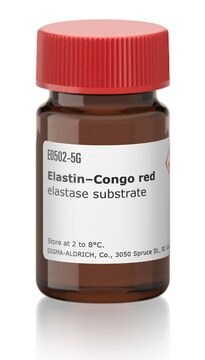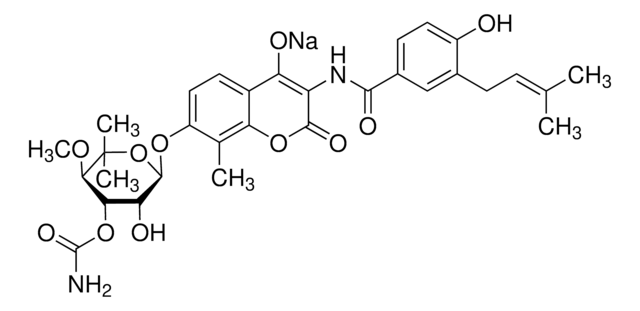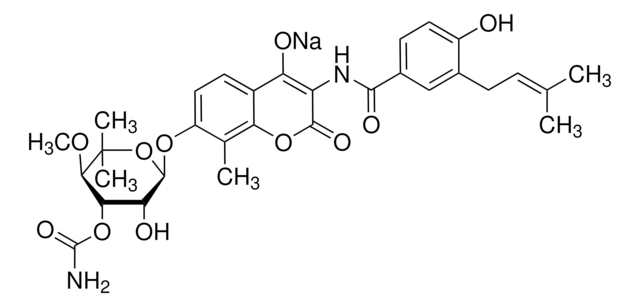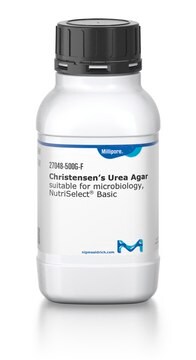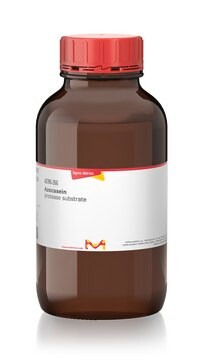D0690
DNA Gyrase from Escherichia coli
aqueous glycerol solution
Se connecterpour consulter vos tarifs contractuels et ceux de votre entreprise/organisme
About This Item
Numéro MDL:
Code UNSPSC :
12352204
Nomenclature NACRES :
NA.54
Produits recommandés
Source biologique
Escherichia coli
Niveau de qualité
Forme
aqueous glycerol solution
Poids mol.
~374 kDa
Concentration
≥2 unit/μL
Technique(s)
cell based assay: suitable
Application(s)
cell analysis
Conditions d'expédition
dry ice
Température de stockage
−70°C
Informations sur le gène
Escherichia coli K12 ... gyrA(946614) , gyrB(948211)
Application
DNA gyrase from Escherichia coli has been used in a study to investigate a comparative proteomic approach to better define Deinococcus nucleoid specificities. DNA gyrase from Escherichia coli has also been used in a study to investigate the role of the DnaK-ClpB bichaperone system in DNA gyrase reactivation.
Actions biochimiques/physiologiques
DNA gyrase is supplied as an A2B2 holoenzyme. The molecular mass of subunit A is 97 kDa and that of subunit B is 90 kDa. It catalyzes the ATP-dependent introduction of negative supercoils into relaxed DNA. DNA gyrase has been successfully converted into a type II topoisomerase by mutagenesis experiments.
Can be used to supercoil plasmids.
Définition de l'unité
One unit of gyrase activity will supercoil 0.5 micrograms of pBR-322 DNA in 30 minutes at 37 °C.
Autres remarques
Solution in 50% Glycerol containing Tris buffer, DTT and EDTA.
Code de la classe de stockage
10 - Combustible liquids
Classe de danger pour l'eau (WGK)
WGK 1
Point d'éclair (°F)
Not applicable
Point d'éclair (°C)
Not applicable
Faites votre choix parmi les versions les plus récentes :
Déjà en possession de ce produit ?
Retrouvez la documentation relative aux produits que vous avez récemment achetés dans la Bibliothèque de documents.
S C Kampranis et al.
Proceedings of the National Academy of Sciences of the United States of America, 93(25), 14416-14421 (1996-12-10)
DNA gyrase is unique among topoisomerases in its ability to introduce negative supercoils into closed-circular DNA. We have demonstrated that deletion of the C-terminal DNA-binding domain of the A subunit of gyrase gives rise to an enzyme that cannot supercoil
Alix Pantel et al.
Antimicrobial agents and chemotherapy, 56(4), 1990-1996 (2012-02-01)
Fluoroquinolone (FQ) resistance is emerging in Mycobacterium tuberculosis. The main mechanism of FQ resistance is amino acid substitution within the quinolone resistance-determining region (QRDR) of the GyrA subunit of DNA gyrase, the sole FQ target in M. tuberculosis. However, substitutions
Magali Toueille et al.
Journal of proteomics, 75(9), 2588-2600 (2012-03-27)
Compared to radiation-sensitive bacteria, the nucleoids of radiation-resistant Deinococcus species show a higher degree of compaction. Such a condensed nucleoid may contribute to the extreme radiation resistance of Deinococcus by limiting dispersion of radiation-induced DNA fragments. Architectural proteins may play
Teresa Lara-Ortíz et al.
Canadian journal of microbiology, 58(2), 195-199 (2012-01-24)
In Escherichia coli cells, an increase in temperature induces immediate DNA relaxation, followed by the fast recovery of DNA supercoiling. DNA gyrase, proteins synthesized during heat stress, and chaperone DnaK have been proposed to participate in this recovery. However, the
Valentina Monica et al.
Lung cancer (Amsterdam, Netherlands), 79(3), 228-235 (2013-01-02)
Thymic epithelial tumors include several entities with different biologic behavior. Chemotherapy is indicated in advanced disease, but limited data exist on gene expression correlation with the response to chemotherapeutic agents. A series of 69 thymic neoplasms (7 A-, 6 AB-
Notre équipe de scientifiques dispose d'une expérience dans tous les secteurs de la recherche, notamment en sciences de la vie, science des matériaux, synthèse chimique, chromatographie, analyse et dans de nombreux autres domaines..
Contacter notre Service technique

